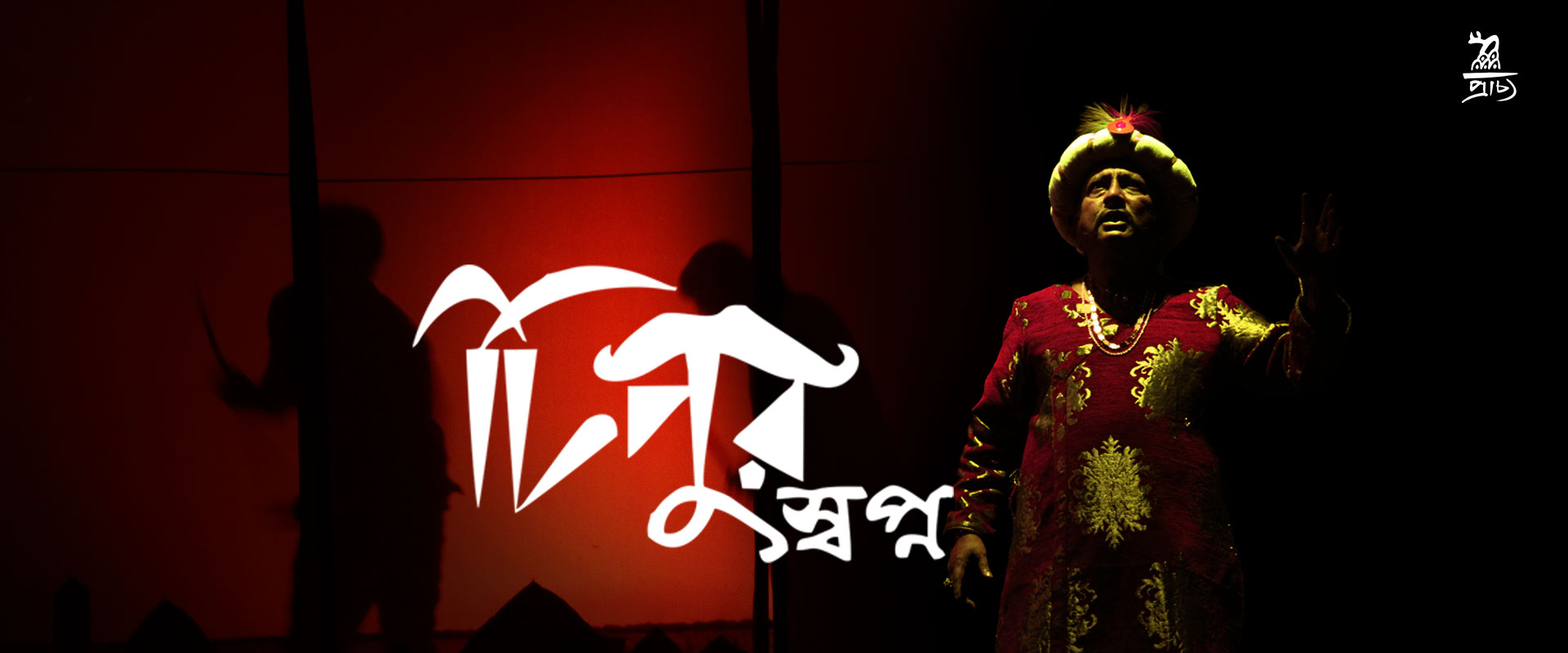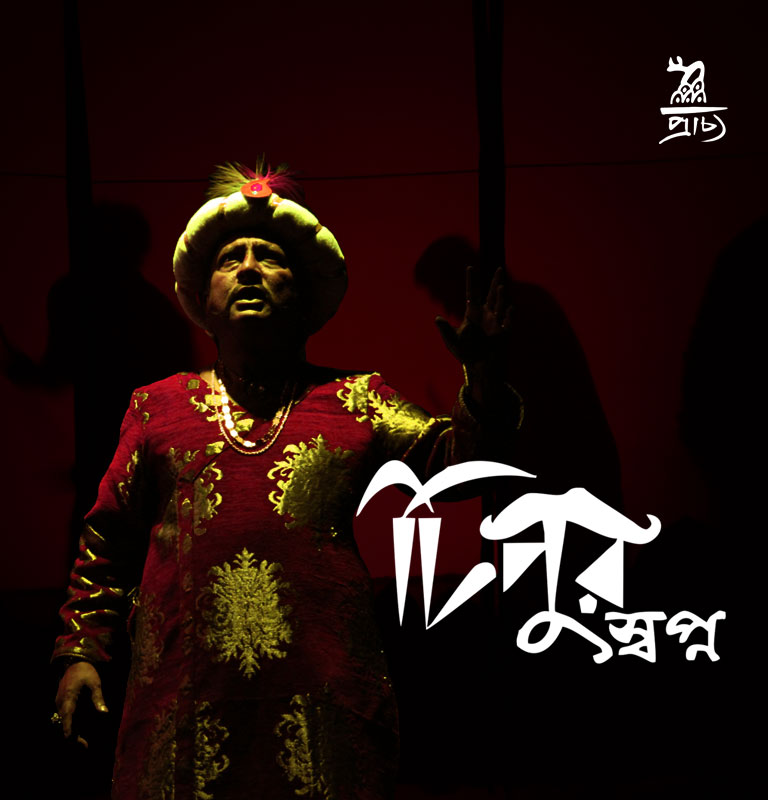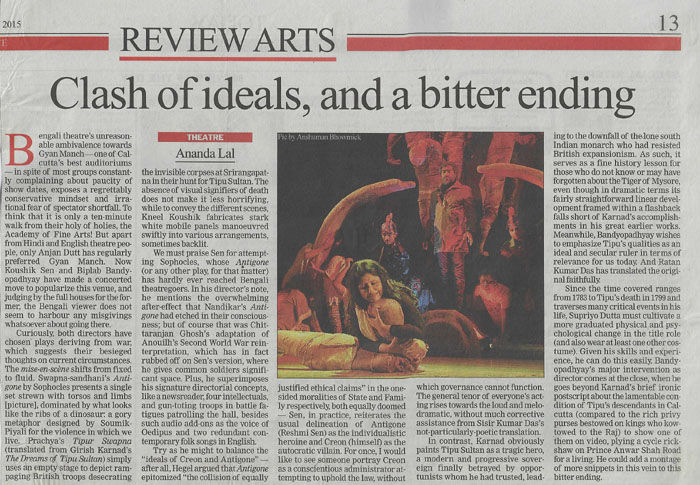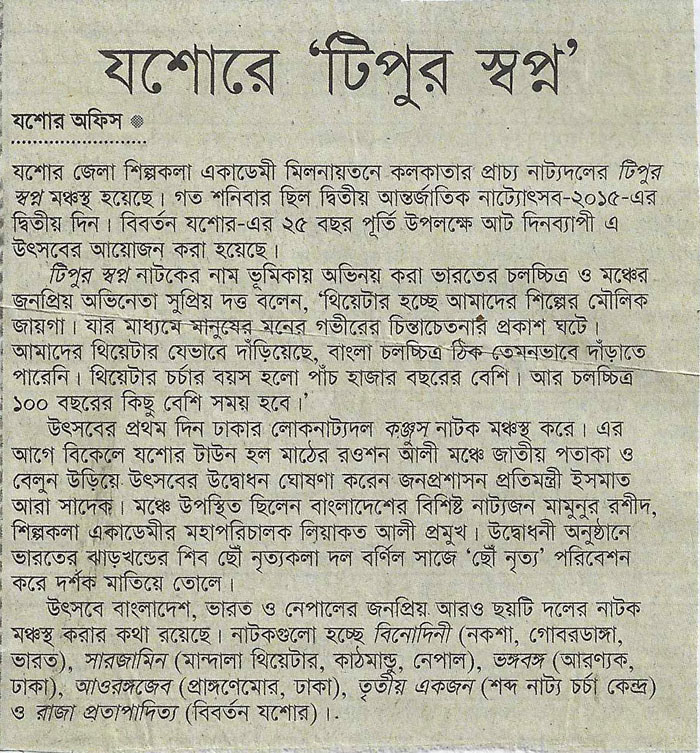

Tipur Swapno
Director's Note
“A Sprout form which ‘it’ germinated is still capable of reproducing”- Bertolt Brecht.
Renowned theatre activist/director/playwright, respected Mr Girish Karnad, is one of the best Dramatist, the Independent India has ever seen, there is nothing new to add regarding this.
Bengal Theatrical fraternity is well-informed and evenly enriched by Mr. Karnad theatrical skills and practices. Me, being a humble theatre activist and student of theatre, have got the opportunity to read some of his plays, but, surprisingly I never come actors his very famous play – ‘the dream of Tipu Sultan’, Respected playwright Mr. Ratan Kumar Das, enlightened me about this play. Meanwhile, while discussing the play with my dear friend, Suman Mukhopadhyay (theatre director), he gave me a translated book of Shivaji Bandyopadhyay to read. I also selected the English version of the play.
In 1996, the occasion of ‘the completion of 50 years of independence’ for a BBC project, the play, ‘The Dream of Tipu Sultan’ was written as a Radio-play. Finally, in the year of 2008, it was rewritten for proscenium theatre, and at present, it is published in two languages, Kannada and English.
Meanwhile, I also got the opportunity to read an elaborated account, containing numerous facts and figures along with Eleseriptive analysis regarding Tipu Sultan, written by Respected – Mr. Ashok Sen.
I acknowledge all the above mentioned creative personalities for their direct and indirect contribution in enriching me in my journey towards staging one of my dreams – ‘The dreams of Tipu Sultan (‘Tipu’r Swapno’).’
To acknowledge the existence of our ‘past’ is a part of rich heritage of our Indian culture. But, looking at the present socio-politico-economical condition of India, some doubts and fear lurks my mind and question haunts me frequently – ‘Will our Rich heritage, our culture, be source with time?
May be not??
At this moment, in our ‘Swachh Bharat’, when masked in humanity has turned out to be a weapon in disguise, hiding behind the shadows of ‘racism’, politically igniting the ‘shielded’ liberation of our existence, of our country, the unmasked version of truth shows the sorry state of our ‘secularism’, which is weakening day-by-day, slowly fading out of our life, leaving is helpless and lost.
Unmasked truth, also brings a ray of hope, in disguise, of A great leader- Tipu Sultan, while comparing the scenarios of great legacies and heritage of our country, judging the present the state of our country, it’s very important to go through Tipu legacy, his role in understanding ‘progress’ his ideologies, his innovative thoughts, his keen interest to learn, his urge and struggle towards ‘better’, his mission, vision and above all, his dream of seeing a ‘progressive’ India, in its true sense and essence.
“Tipu must fall” were the words they chanted, but “Tipu can never fall” is the fact they denied.
Synopsis
Tipur Swapno (The Dreams of Tipu Sultan) narrates the struggle and bravery of one of the most politically perceptive and tragic figures in modern Indian history, where the warrior’s dreams also became palpable. It is the re-incarnation of Tipu’s feats and dreams, one of the modernist ruler’s approach of emboldening his land in trade, industry and defense keeping in mind the idea of harmony.
In this mission he developed trade relationship with China and even he sent ambassadors to France war assistance and importing modern weapons to combat the then British in traders. Like many a dreamers he became lone in his own way where his contemporary disintegrated stately rulers, confined in their own world of flattery and contrivance became oblivious about the impending danger of the foreign rulers, befriended Tipu. The British, taking advantage of the situation made the Marathas, the Nizam their allies and launched the most vicious attack on Tipu, in which the latter succumbed and was forced to sue for peace and as a condition of it the two minor sons of Tipu were handed over to the British as hostages. Though there could not curb the indomitable free spirit of Tipu. The British also knew that if they could not eliminate Tipu their desire to grab the country would not be fulfilled.
After some futile attempts the termination of Tipu was done in the battle of Seringapatam and his sons were sent to Calcutta under surveillance. Tipu died with his unsown dreams in heart and it was not Tipu’s dreams but his predictions that come true.
Premiered On
—————————
Cast
- Hussain Ali Kirmani: Satyapriyo Sarkar
- Colin Mackenzie: Suman Nandy
- Richard Wellesley: Krishnagati Chatterjee
- Wlliam Kirkpatrick: Aradhya Banerjee
- Arther Wellesley: Abhisek Mallick
- Mark Wilkies: Subrata Bhattacharya
- British & Martha Soldier: Aniruddha Sanpui & Arpan Banerjee
- Purnaiah: Asim Roy Chowdhury
- Nadim Khan: Abhijit Dalal
- Mir Sadiq: Subhasish Chakraborty
- Ghulam Ali Khan: Santanu Chatterjee
- Kamaruddin: Asit Dey
- Hyder Ali: Santanu Chatterjee
- Elit: Kaushik Ghosh
- Osman Khan: Prasanta Sinha
- Moizuddin: Soujanya Ghosh
- Abdul Khaliq: Saswata Ray
- Zafar & Servent: Gourab Bhatta
- Chinese Visitor: Prasenjit Chakraborty & Arpan Banerjee
- Rokeya Banu: Rinita Majumdar
- Maratha Yubak: Saoli Chattopadhyay
- Devi Murti: Nibedita Mukherjee & Sumana Kar
- Hasina: Sahely Sen
- Old Woman: Bhaswati Mukherjee
- Nana Fadnavis: Samir Chaterjee
- Charlse Mallet: Sujay Raj Maitra
- Tipu Sultan: Supriyo Dutta
Creative Coordinators
- Background Music – Dishari Chakraborty
- Set and Design – Kneel Kaushik
- Makeup – Sanjay Pal
- Light Projection – Dipankar Dey
Creators
- Play – Girish Karnad
- Translation – Ratan Kumar Das
- Direction – Biplab Bandyopadhyay
Review



